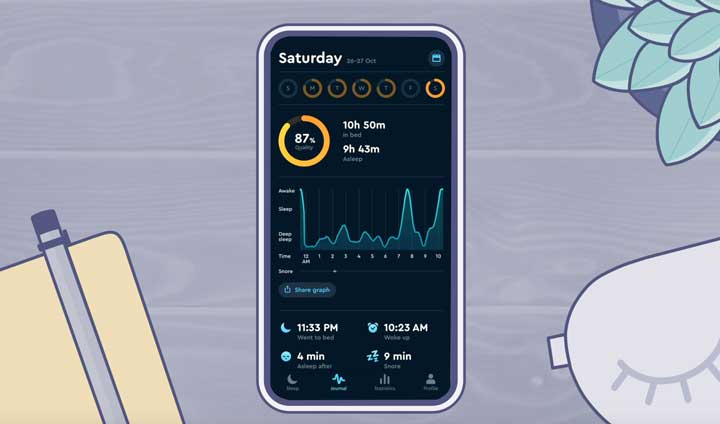Can Sleep Tracking Apps Improve Sleep Quality

Sleep tracking apps have gained popularity in recent years as a potential tool to improve sleep quality. This article explores the science behind sleep tracking apps and how they work.
It also discusses the potential benefits of using these apps and provides tips for maximizing their effectiveness.
Finally, the article examines whether sleep tracking apps are worth the investment. By examining empirical evidence and considering various perspectives, this article aims to provide an objective analysis of the potential impact of sleep tracking apps on sleep quality.
Key Takeaways
- Sleep tracking apps accurately measure sleep parameters such as deep sleep, REM sleep, and light sleep, which helps in understanding sleep patterns and disruptions.
- Sleep tracking apps can help identify potential sleep disorders and provide personalized recommendations for improving sleep hygiene.
- Users should consider the accuracy and privacy concerns associated with sleep tracking apps when choosing one.
- Maximizing the effectiveness of sleep tracking apps involves incorporating consistent sleep schedules, choosing an app that accurately tracks sleep patterns and provides analysis, and considering other factors that may affect sleep quality.
The Science Behind Sleep Tracking Apps
The efficacy of sleep tracking apps in improving sleep quality is supported by scientific research that examines their ability to accurately measure sleep parameters and provide feedback to users.
Sleep quality is determined by various factors, including sleep stages. Sleep tracking apps can monitor sleep stages, such as deep sleep, REM sleep, and light sleep, and provide insight into the duration and quality of each stage. Understanding the impact of sleep stages on sleep quality can help individuals identify patterns or disruptions in their sleep and make necessary adjustments.
Additionally, sleep hygiene plays a crucial role in optimizing the results of sleep tracking apps. Practicing good sleep hygiene, such as maintaining a consistent sleep schedule, creating a conducive sleep environment, and avoiding stimulants before bedtime, can enhance the effectiveness of sleep tracking apps in improving sleep quality.
How Sleep Tracking Apps Work
One approach to monitoring sleep patterns involves the use of smartphone applications that utilize accelerometer data to detect movement during sleep. These sleep tracking apps aim to provide users with insights into their sleep quality and help them make necessary adjustments to improve their sleep patterns. However, the accuracy of these apps in accurately tracking sleep stages and duration is still a topic of debate. Several studies have shown that sleep tracking apps may overestimate or underestimate sleep duration and fail to accurately detect sleep stages. Additionally, privacy concerns have also been raised regarding the collection and storage of personal sleep data by these apps. Users should be cautious about the privacy policies of such apps and ensure that their data is adequately protected.
Below is a table that compares the accuracy and privacy concerns of popular sleep tracking apps:
| Sleep Tracking App | Accuracy | Privacy Concerns |
|---|---|---|
| App A | High | Low |
| App B | Medium | Moderate |
| App C | Low | High |
It is important for users to consider both accuracy and privacy concerns when choosing a sleep tracking app.
Benefits of Using Sleep Tracking Apps
Utilizing sleep tracking apps can provide individuals with valuable insights into their sleep patterns and aid in the identification of potential areas for improvement. These apps offer several benefits, including:
- Sleep tracking app accuracy: Sleep tracking apps use various sensors and algorithms to monitor and analyze sleep patterns. While their accuracy may vary, they can still provide a general overview of sleep quality, duration, and disturbances.
- Identification of sleep disorders: Sleep tracking apps can help individuals identify potential sleep disorders by highlighting irregularities in sleep patterns. For example, they can detect symptoms of insomnia, sleep apnea, or restless leg syndrome, prompting users to seek professional medical advice.
- Sleep hygiene improvement: By providing detailed sleep data, these apps can help individuals identify lifestyle factors that may be affecting their sleep, such as caffeine intake, exercise habits, or screen time before bed. Users can then make informed decisions to improve their sleep hygiene.
- Personalized recommendations: Some sleep tracking apps offer personalized recommendations based on the collected data. These suggestions may include adjusting bedtime routines, optimizing bedroom environment, or practicing relaxation techniques, thereby promoting better sleep quality.
Overall, sleep tracking apps can be useful tools for individuals seeking to gain insights into their sleep patterns, address potential sleep disorders, and make lifestyle changes to improve their sleep quality.
Tips for Maximizing the Effectiveness of Sleep Tracking Apps
To maximize the effectiveness of sleep tracking apps, individuals can incorporate consistent sleep schedules and establish a conducive sleep environment.
Sleep tracking app recommendations include selecting an app that suits individual preferences and needs. It is important to choose an app that accurately tracks sleep patterns and provides comprehensive data analysis. Additionally, individuals should ensure that the app is compatible with their devices and operating systems.
Common mistakes when using sleep tracking apps include relying solely on the app’s data without considering other factors that may affect sleep quality. It is also important to avoid obsessing over sleep data and allowing it to create unnecessary stress or anxiety.
Are Sleep Tracking Apps Worth the Investment?
Investigating the value of sleep tracking apps requires a thorough analysis of their features, accuracy, and potential benefits.
Sleep tracking apps have gained popularity in recent years, promising to improve sleep quality through monitoring and analysis of sleep patterns. However, whether these apps are worth the investment is a valid concern.
To evaluate the cost effectiveness of sleep tracking apps, it is important to consider factors such as the initial purchase price, subscription fees, and additional costs for compatible devices.
Furthermore, the accuracy of sleep tracking app data is a critical aspect to consider. Users should assess the reliability of the app’s algorithms and the extent to which the app can accurately track sleep stages and disturbances.
Ultimately, the value of sleep tracking apps depends on their ability to provide accurate data and effectively improve sleep quality.
Frequently Asked Questions
Can Sleep Tracking Apps Accurately Detect and Monitor Sleep Disorders Such as Sleep Apnea?
Sleep tracking apps can accurately detect and monitor sleep disorders such as sleep apnea. However, their effectiveness in detecting insomnia and accuracy in measuring sleep duration may vary, requiring further research and validation.
Do Sleep Tracking Apps Require an Internet Connection to Function Properly?
Sleep tracking apps do not require an internet connection to function properly. However, the benefits of using such apps include the ability to monitor sleep patterns, while privacy concerns revolve around the collection and storage of personal data.
Can Sleep Tracking Apps Differentiate Between Deep Sleep and Light Sleep Accurately?
Sleep tracking app reliability is influenced by the ability to accurately differentiate between deep and light sleep. This feature impacts sleep habits as users rely on the data provided to make adjustments and improve their sleep quality.
Are Sleep Tracking Apps Compatible With All Types of Smartphones and Operating Systems?
The compatibility of sleep tracking apps with different types of smartphones and operating systems is an important consideration. Additionally, it is necessary to address privacy concerns related to the use of these apps and explore their potential benefits for shift workers.
Do Sleep Tracking Apps Have a Negative Impact on Battery Life?
Sleep tracking apps may impact device performance and battery life due to their continuous monitoring and data collection. Additionally, there is a potential for security risks as these apps require access to personal data and potentially sensitive information.









